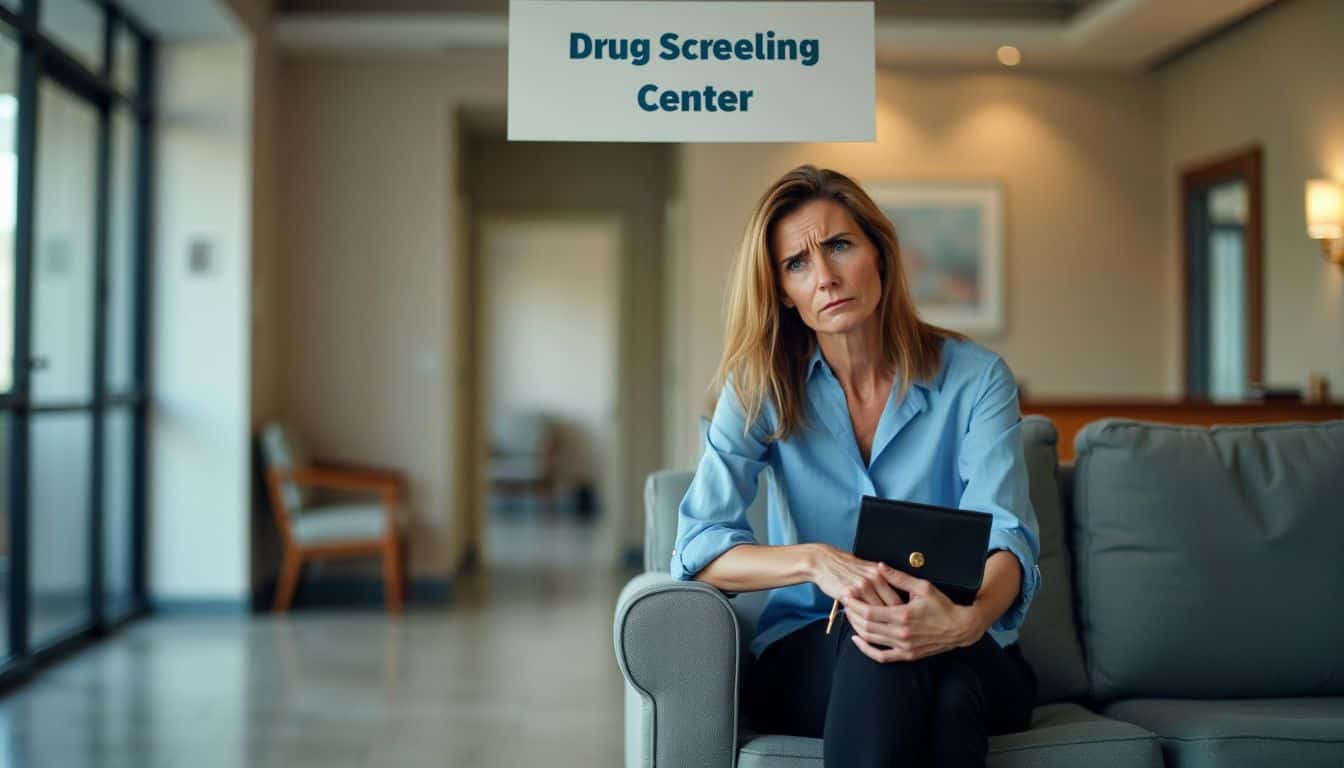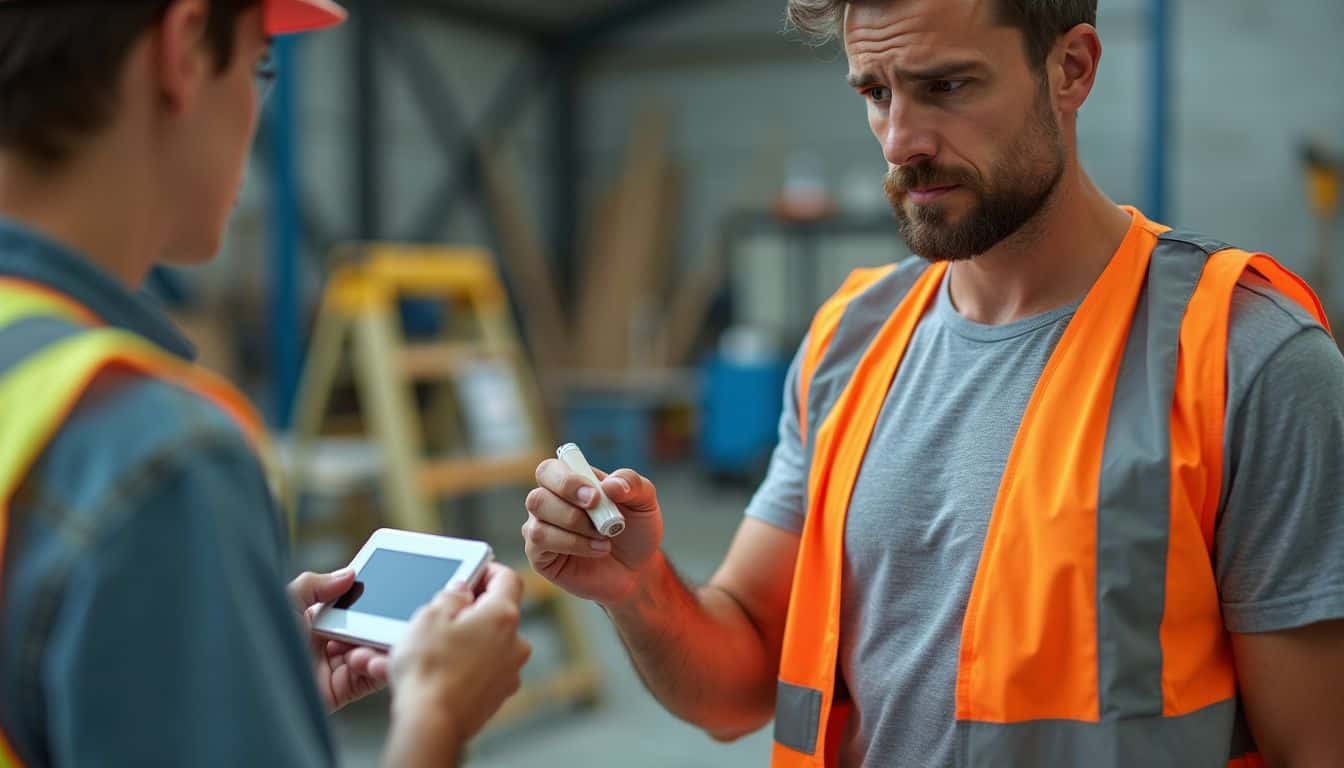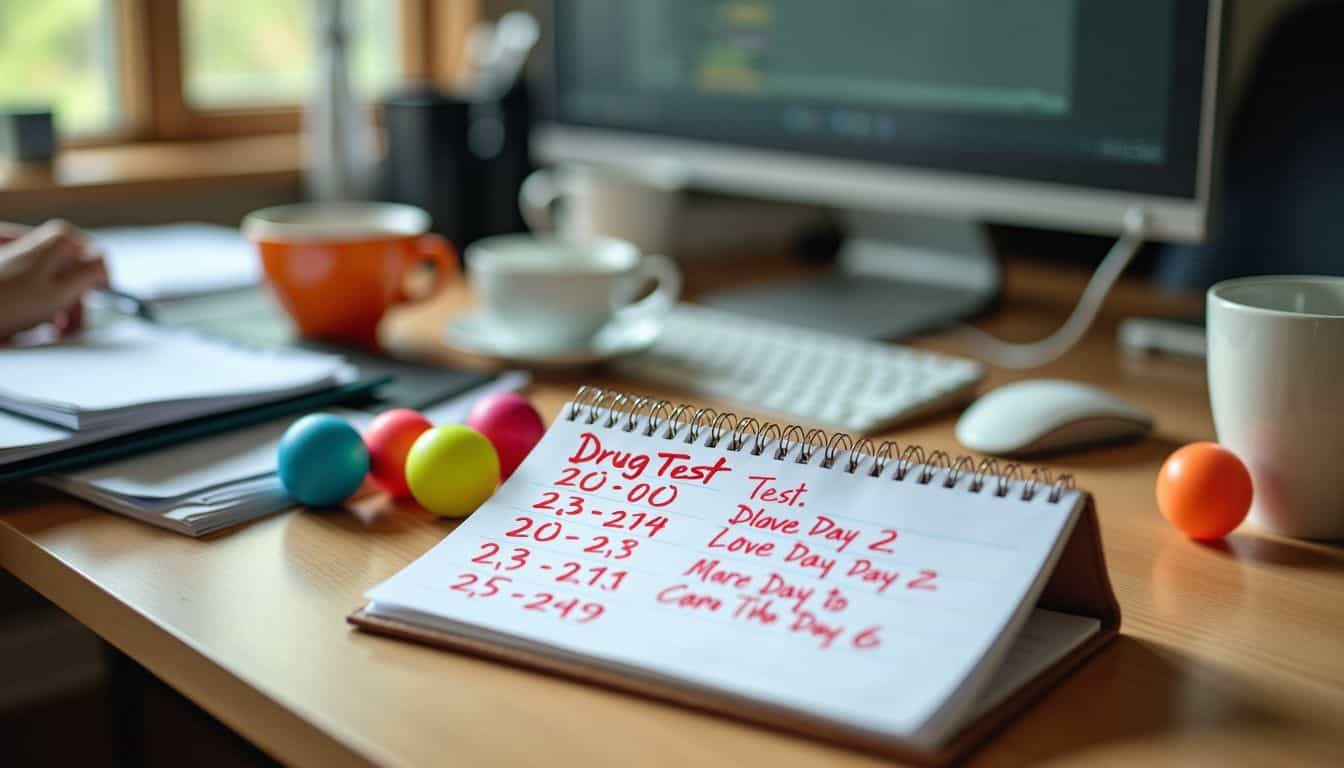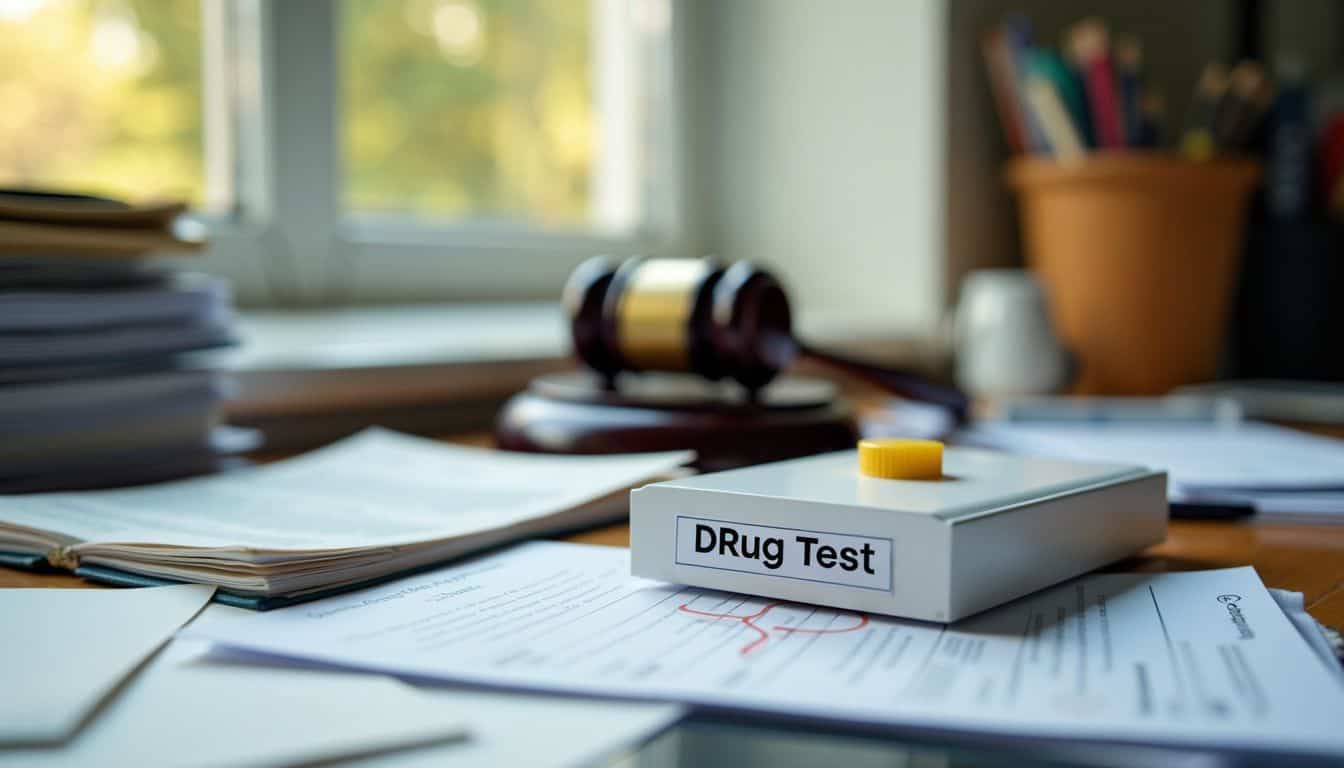Got a job offer but worried about the drug test? You’re not alone. Over 80% of employers use drug screening to vet candidates. 3 This article breaks down the types of tests and scenarios you might face.
No more sweating it out – we’ve got your back. Ready to ace that drug test?
Key Takeaways
Over 80% of employers use drug screening to check job candidates. Common tests include urine, hair, blood, saliva, and breath alcohol tests.
Pre-employment, random, scheduled, post-accident, reasonable suspicion, return-to-duty, and follow-up testing are the main scenarios for workplace drug screening.
Federal laws like the Drug-Free Workplace Act of 1988 and state laws govern employment drug testing. Some industries have stricter rules, like transportation jobs.
A good workplace drug testing policy should follow legal requirements, be fair to all employees, and focus on safety. Policies often include details on test types, frequency, and consequences.
Drug test results are private, but can affect employment. Workers have rights during testing, including explaining prescription medications that may affect results.
Table of Contents
What is Drug Screening in Employment?

Drug screening in employment is a hot topic these days. It’s a way for bosses to check if their workers are using drugs or alcohol on the job.
Defining Drug Screening

Drug screening is a common practice in many workplaces. It’s a way for bosses to check if their workers are using illegal drugs or misusing legal ones. Drug screening for employment usually looks for five main substances: speed, pot, cocaine, PCP, and opiates. 1 But some tests can spot other drugs too. The whole process has three parts: collecting a sample, testing it, and sharing the results. 2
Drug tests are like a workplace’s crystal ball – they reveal what’s hidden, but can’t predict the future.
These tests can’t tell how often someone uses drugs or how much they take. They just show if drugs are in the body right now. For women, it’s key to know that some meds, like birth control, might affect test results.
Always be upfront about any pills you’re taking – it’ll save headaches later!
The Role of Drug Screening in Workplace Safety

Drug screening plays a key role in keeping workplaces safe. It helps catch substance abuse before it causes harm. Think about it – 65% of workplace accidents link to drug or alcohol use.
That’s a scary number! By testing employees, companies can spot issues early. This cuts down on injuries, mistakes, and costly problems.
Safety isn’t the only perk of screening. It also boosts morale and saves money. Workers feel more secure knowing their coworkers are sober. Plus, it lowers turnover rates. Did you know 75% of employers deal with opioid abuse issues? Regular testing can nip that in the bud.
It’s not just about catching bad apples – it’s about creating a healthier work environment for everyone. From healthcare to construction, many fields rely on these tests to keep things running smoothly. 3 4
Types of Drug Tests for Employment

Drug tests come in many flavors. Let’s peek at the buffet of options employers use to keep workplaces safe and sober.
Urine Tests for Drug Detection

Urine tests are the go-to method for job-related drug checks. They’re quick, easy, and spot recent drug use. Most employers use them because they work well and don’t cost much. These tests can find drugs used in the last 5–10 days.
They look for common substances like alcohol, speed, downers, painkillers, cocaine, and weed. 2
I’ve taken a few of these tests myself. It’s not fun, but it’s pretty simple. You pee in a cup, and they test it right away. Some folks try to cheat by adding stuff to their sample.
But labs are smart – they check for that too. The whole process is private and follows strict rules. It’s all about keeping workplaces safe and drug-free. 5
Urine tests are like a window into recent drug use – they tell a clear story about what’s been in your system lately.
Analyzing Drugs through Hair Tests

Hair tests are pretty cool for finding drugs. They can spot stuff you used months ago! That’s way longer than other tests. They’re great at catching cocaine and oxycodone use. But they’re not cheap – each test can cost over $100. 6 And sometimes, people don’t have enough hair to test.
I once had a friend who needed a hair test for a new job. She was nervous because she’d tried pot at a party three months earlier. The test found it! 7 Hair tests can see drug use from up to 90 days back.
That’s why some companies like them. But they won’t show very recent use – like in the past week or two. It’s a trade-off between seeing long-term habits and catching current users.
Blood Screens in Employment Testing

Blood tests for job screening aren’t common. They’re expensive and intrusive. Most employers avoid them unless absolutely necessary. These tests mainly check alcohol levels. They’re very accurate but only show recent use.
The detection window is short – just 1 to 2 days. 2 That’s why they’re not typical for regular job tests.
If you ever have to take a blood test, don’t worry. It’s quick and done by a professional. The needle pinch is short. Results come quickly – often within hours. But keep in mind, this test can detect both legal and illegal substances. 5 So, if you’re taking any medications, let the tester know beforehand. Next, let’s talk about a less invasive option – saliva tests.
Saliva Tests for Quick Screening

Saliva tests are a quick and easy way to check for drugs. They’re less invasive than other tests – no needles or peeing in cups! You just swab the inside of your cheek or under your tongue. 9 It’s pretty fast too. Results can come back in minutes or get sent to a lab for double-checking. 8
These tests can spot drug use from the last 5 to 48 hours. 8 They’re great for random testing or after accidents at work. Some bosses like them because they’re harder to cheat on than urine tests.
Saliva tests: quick, easy, and way less awkward than peeing in a cup!
Plus, they’re less embarrassing for everyone involved.
Breath Alcohol Tests for On-the-Spot Assessment

Breath alcohol tests are quick and easy ways to check if someone’s been drinking. They’re like magic wands for bosses who want to keep the workplace safe. These tests can spot booze in your system for up to 12 hours after you’ve had a drink. 10 I once saw a coworker get fired for drinking on the job after failing one of these tests. It was a wake-up call for everyone.
These tests are super handy because they give results right away. No waiting around or sending samples to a lab. They’re also not invasive – you just blow into a tube. Bosses love them because they can check if someone’s drunk at work without much fuss. 2 It’s all about keeping everyone safe and sound on the job.
Scheduling of Drug Tests by Employers

Employers have many options for when to test workers. They can check before hiring, randomly, or after accidents. It’s a balancing act between safety and privacy.
Pre-Employment Drug Screening
Pre-employment drug screening is a common step in the hiring process. Many companies use it to check if job applicants use illegal drugs. 11
- What it involves: You’ll likely give a urine sample at a lab. The test looks for drugs like cocaine, marijuana, and opiates. 1
- Timing: Most employers ask for the test after a job offer. You’ll usually have 24 to 48 hours to complete it.
- Legal stuff: Federal law doesn’t require these tests for most jobs. But some states have rules about how and when they’re done.
- Positive results: If drugs show up, you might lose the job offer. Some companies give second chances or let you explain.
- Privacy concerns: Labs must keep your results private. Only the employer who ordered the test can see them.
- Prescription meds: Tell the lab about any prescriptions you take. This helps avoid false positives.
- Refusing the test: You can say no, but most employers won’t hire you if you do.
- Accuracy: These tests are pretty spot-on. But mistakes can happen, so you can ask for a retest if needed.
- Cost: The company usually pays for the drug screen. It’s part of their hiring costs.
- Frequency: Some jobs require regular testing after you’re hired. This is common in fields like transportation.
Random Drug Screening Processes
Random drug screening keeps workers on their toes. It’s a smart way for companies to maintain a safe workplace.
- Surprise factor: Random tests catch employees off guard. No one knows when they’ll be picked, so it’s harder to cheat.
- Fair selection: A computer usually picks who gets tested. This stops any claims of unfair targeting.
- Frequency matters: Some places test monthly, others yearly. The more often, the more effective it is. 1
- Quick turnaround: Results often come back fast. This helps bosses make quick decisions about safety.
- Various test types: Urine, saliva, or breath tests are common. Each checks for different drugs.
- Cost-effective: Random tests are cheaper than testing everyone all the time. That’s why 90% of big companies use them. 12
- Deterrent effect: Just knowing tests might happen cuts down drug use. Workers report using less marijuana when random tests are in place.
- Legal considerations: Laws vary by state. Some limit how often you can test or what drugs to look for.
- Privacy concerns: Some folks worry about their rights. Good policies balance safety and privacy.
- Positive results handling: Companies need clear rules for what happens if someone tests positive. This might include rehab options or job loss.
Scheduled Periodic Drug Testing
Scheduled periodic drug testing keeps workplaces safe year-round. It’s a common practice in jobs where safety is key.
- Regular checks: Companies set up tests at specific times during the year. All employees take part, no exceptions. 1
- Safety first: These tests help prevent accidents. They make sure workers aren’t using drugs that could cloud their judgment. 12
- Industry rules: Some fields, like trucking, require these tests by law. It’s part of following the rules and staying legal.
- Fewer risks: Regular testing cuts down on drug use at work. Employees know they’ll be tested, so they’re less likely to use.
- Lower drug use: Studies show that companies with scheduled tests see less drug use overall. It’s a win for everyone’s health and safety.
- Fair process: Everyone gets tested on the same schedule. This way, no one feels singled out or treated unfairly.
- Ongoing protection: Unlike one-time tests, scheduled checks keep the workplace safe all year. It’s like having a safety net that’s always there.
- Clear expectations: Employees know when tests are coming. This helps them plan and stay clean if they need to.
- Better work culture: Regular testing shows that a company values safety. It can boost morale and trust among workers.
- Cost-effective: Scheduled tests can be cheaper than random ones. Companies can plan for them in their budgets.
Post-Accident Drug Testing Requirements
Post-accident drug testing is a crucial part of workplace safety. Let’s dive into what it means for you and your job.
- Timing matters: Tests must happen within 32 hours for drugs and 8 hours for alcohol after an accident. 13
- Who gets tested: It’s not just for truckers. Many jobs require it after workplace mishaps. 14
- DOT rules: If you drive for a living, the Department of Transportation has special rules for when you must be tested.
- Saying no is a big deal: Refusing a test is like failing it. You could lose your job.
- Paperwork is key: If a test can’t happen on time, your boss needs to write down why.
- Industry-specific rules: Different agencies like FAA and FMCSA have their own testing rules.
- Positive results: If you test positive, you might face disciplinary action or need to join a rehab program.
- Safety first: These tests help keep everyone safe at work, including you and your coworkers.
- Legal stuff: There are federal and state laws about drug testing. It’s not just your company’s idea.
- Privacy concerns: Your test results are private, but they can affect your job.
Drug Tests on Reasonable Suspicion
After an accident, companies might test workers. But sometimes, bosses notice signs that make them concerned about drug use right now. Here’s how “reasonable suspicion” drug tests work:
- What it means: Bosses can request a drug test if they observe clear signs of possible drug use. These signs could be:
- Seeing someone use drugs
- Unusual behavior that’s not typical for that person
- Difficulty performing their job correctly 1
- Why it’s important: These tests help ensure everyone’s safety at work. They’re common in jobs where safety is crucial, like truck driving or operating machinery.
- How it happens: If a boss suspects someone might be on drugs, they’ll typically:
- Document what they observed
- Consult with another manager about it
- Ask the worker to take a drug test immediately
- What gets tested: The test might check for:
- Illegal drugs like cocaine or heroin
- Prescription drugs that can impair functioning
- Alcohol (using a breath test) 5
- What happens next: If the test comes back positive:
- The worker might be sent home
- They could lose their job
- They might get a chance to receive help, like going to rehab
- Legal considerations: Companies need to be careful with these tests. They should:
- Have clear policies about when they can request a test
- Train bosses on how to identify drug use signs
- Treat all workers consistently
- Worker rights: Even if you’re asked to take a test, you have rights:
- You can refuse (but you might lose your job)
- You can explain if you’re taking medication that might affect the test
- You can request a second test if you think the first one was incorrect
If you don’t like your job, it’s better to look for a new one than to turn to drugs. Stay safe and healthy at work, ladies!
Return-to-Duty Drug Screening
After reasonable suspicion testing, some employees may need to go through return-to-duty screening. This process helps ensure workers are fit to come back to their jobs after substance-related issues. Here’s what you need to know about return-to-duty drug screening:
- Mandatory for certain jobs: If you work in transportation or other safety-sensitive fields, you’ll likely face this screening. It’s a must for employers regulated by the Department of Transportation. 15
- Evaluation by a pro: A Substance Abuse Professional (SAP) will check you out first. They’ll decide what treatment you need before returning to work.
- Treatment program: You’ll have to complete a program the SAP recommends. It could be counseling, rehab, or both. No shortcuts here!
- Passing the test: Once you’ve finished treatment, you’ll take another drug test. You must pass this to get back on the job.
- Long-term follow-up: Don’t think you’re off the hook after one clean test. Expect more screenings for up to five years. At least six tests in the first year are common. 5
- Direct observation: Yep, it’s as awkward as it sounds. Someone will watch you provide your sample to prevent cheating.
- No job guarantee: Heads up, ladies – your employer doesn’t have to hold your position while you go through this process. It’s a tough break, but that’s how it is.
- Costs involved: Treatment and testing can be pricey. Some companies help with expenses, but others might leave it to you. Better check your policy!
- Privacy concerns: Your results are confidential, but your employer will know if you pass or fail. It’s a delicate balance between privacy and safety.
- Second chances: This process is about helping you, not punishing you. It’s your shot at a fresh start in your career.
Follow-up Drug Testing Procedures
After returning to work, employees may face ongoing drug tests. These follow-up checks help keep the workplace safe and drug-free. Here’s what you need to know about follow-up drug testing:
- Long-term monitoring: Tests can last up to five years after an employee comes back to work. This keeps tabs on folks who’ve had issues before. 12
- Frequent early checks: At least six tests happen in the first year back. It’s like a probation period to make sure everything’s on track.
- Safety focus: These tests are big in jobs where safety really matters. Think truck drivers or machine operators.
- Positive test follow-up: If you’ve tested positive before, expect more tests. It’s not punishment – it’s about keeping you and others safe. 1
- Reporting rules: Bosses must tell the Clearinghouse when follow-up tests are done. This keeps records straight and fair.
- Surprise factor: You won’t know when these tests are coming. It keeps everyone on their toes and honest.
- Different test types: Follow-ups might use urine, hair, or saliva tests. Each looks for different things over different time periods.
- Legal stuff: The Americans with Disabilities Act plays a role here. It protects recovering addicts while allowing necessary testing.
- Policy importance: A clear drug testing policy helps everyone understand the rules. It’s like a roadmap for staying employed and sober.
- Support systems: Many workplaces offer help programs alongside testing. It’s not just about catching people – it’s about helping them stay clean.
Legal Aspects of Drug Testing

Legal aspects of drug testing can be tricky. Federal and state laws set different rules. Some industries have special requirements. Want to know more? Keep reading!
Federal Laws Governing Employment Drug Tests
Federal laws set the rules for job drug tests. The Drug-Free Workplace Act of 1988 is a big one. It says companies with federal contracts over $100,000 must have drug-free policies.
This law aims to keep workplaces safe and drug-free. 16
Other laws protect workers’ rights during drug tests. The Americans with Disabilities Act stops bias against recovering addicts. But it’s okay for bosses to have no-drug rules. The Family and Medical Leave Act lets folks take time off for drug treatment without losing their jobs.
For union jobs, drug test plans must be talked about with the union first. That’s thanks to the National Labor Relations Act. 2 Lastly, Title VII of the Civil Rights Act makes sure drug policies don’t pick on people for their race, gender, or religion.
State Laws and Variations in Drug Testing
State laws on drug testing can be a real mixed bag. Some states have clear rules, while others don’t say much at all. It’s like a patchwork quilt – each state has its own pattern.
For example, New York and Nevada have put their foot down on testing for marijuana in most cases. 18 But other states? They’re more relaxed about it.
Here’s the kicker – if you’re job hunting, you might face different tests depending on where you live. It’s not just about what you’re tested for, but how and when. Some states say employers must give notice before a test.
Others allow surprise checks. It’s enough to make your head spin! That’s why smart companies always check with lawyers to stay on the right side of the law. After all, no one wants to step in a legal mess-up, right? 17
Regulations Specific to Industry Drug Testing
Different jobs have different rules for drug tests. For example, truck drivers and pilots must follow strict federal laws. The Omnibus Transportation Employee Testing Act of 1991 says these workers need drug tests.
Other industries like defense have their own rules too. The Department of Defense makes contractors keep a drug-free workplace. 1
Some jobs are more dangerous than others. That’s why they have tougher drug testing rules. Random tests help keep workers in risky jobs from using drugs. It’s all about keeping everyone safe.
Companies must follow these special rules or face big trouble. 4 Next, let’s look at how to create a good drug testing policy.
Creating a Drug Testing Policy

Creating a drug testing policy isn’t just about rules. It’s about keeping your workplace safe and fair. A good policy helps everyone know what to expect – and that’s a win-win for bosses and workers alike.
Steps to Develop an Effective Drug Testing Policy
Creating a solid drug testing policy is key for any workplace. Here’s a guide to help you craft one that’s fair and effective:
- Understand the laws: Learn about federal and state rules on drug testing. They can be complex, so this step is crucial! 19
- Clarify your goals: What are you aiming for? Perhaps it’s a safer workplace or lower insurance costs.
- Select your tests: Decide which drug tests you’ll use. Urine tests are common, but saliva or hair tests might be more suitable for your needs.
- Establish clear rules: Outline when tests occur – before hiring, randomly, or after accidents. 3
- Educate your team: Ensure managers can recognize signs of drug use and know the next steps.
- Prepare for positive results: Determine how you’ll respond if someone tests positive. Will you offer support or terminate employment?
- Seek legal advice: Have a lawyer review your policy to ensure it’s comprehensive.
- Communicate openly: Inform all employees about the policy. Avoid surprises!
- Maintain consistency: Apply the rules uniformly for everyone, every time.
- Protect privacy: Handle test results like any other confidential medical information.
- Update regularly: Laws and best practices evolve. Review your policy periodically.
A good policy keeps everyone safe and informed. It’s about creating a healthy workplace for all, not catching people.
Best Practices in Conducting Drug Tests
Drug tests can be tricky, but they don’t have to be a headache. Here are some top tips for conducting them like a pro:
- Give a heads-up: Let jobseekers know about the test in advance. It’s only fair, and it shows you respect their time.
- Keep it equal: Use the same testing rules for everyone applying to similar jobs. No playing favorites! 1
- Choose certified labs: Pick state-certified labs for testing. They know their stuff and follow the rules.
- Privacy matters: Conduct tests in private settings. Nobody wants an audience for this kind of thing.
- Allow do-overs: Let folks challenge failed results. Sometimes mistakes happen, and it’s good to double-check.
- Make it clear: Tell applicants that job offers depend on passing the test. No surprises here!
- Put it in writing: Create a clear drug testing policy. Include why you’re testing, who gets tested, how you’ll keep results private, and what happens if someone fails.
- Train your team: Make sure your HR folks know how to handle drug tests properly. Knowledge is power!
- Stay up-to-date: Keep an eye on changing laws about drug testing. The rules can shift faster than you’d think. 3
- Be consistent: Apply your policy fairly across the board. No exceptions, no matter who’s involved.
Managing Positive Results from Drug Tests
After setting up good drug test practices, you’ll need to handle positive results. This part can be challenging. Let’s discuss what to do when a test comes back positive. 5
First, don’t jump to conclusions. False positives happen. Maybe it’s a mix-up with meds or something else. 2 Get a second test to be sure. If it’s still positive, have a chat with the person.
Listen to their side. They might need help, not punishment. Maybe offer resources for substance use issues. But keep in mind, safety comes first. If the job is high-risk, you might need to make tough choices.
Always follow your company policy and the law. It’s a balancing act between helping people and keeping everyone safe.
People Also Ask
What’s the deal with job drug screenings?
Job drug screenings are tests employers use to check if you’re using drugs. They’re like a sneak peek into your private life. Companies do this to keep the workplace safe and avoid hiring folks with substance use disorders. These tests can spot everything from marijuana to opioids.
How many types of drug tests are there?
There are six main types of drug tests. Urinalysis is the most common. It’s like peeing in a cup for science. Other methods include saliva testing, blood tests, hair tests, sweat testing, and breath testing. Each has its own pros and cons.
Can my boss make me take a drug test whenever they want?
Not so fast! While some jobs allow random drug testing, it’s not a free-for-all. Rules vary by state and industry. For instance, jobs involving heavy machinery or public safety often have stricter policies. It’s like playing by different rules depending on where you work.
What if I’m taking prescription meds? Will they show up?
Prescription meds can indeed show up on drug tests. It’s like getting caught with your hand in the cookie jar, even when you’re allowed to eat cookies! If you’re taking something legit, let your employer know beforehand. They’ll usually ask for proof from your doctor.
Are there laws protecting workers from unfair drug testing?
You bet! The Americans with Disabilities Act (ADA) and the Fair Credit Reporting Act offer some protection. It’s like having a shield against unfair practices. These laws make sure employers don’t discriminate against people with certain medical conditions or past addictions.
What happens if I fail a drug test?
Failing a drug test can be a real bummer. Consequences vary, but they might include not getting hired, being fired, or having to attend drug and alcohol rehabilitation. Some companies have a zero-tolerance policy, while others might give you a second chance. It’s like walking on thin ice – one wrong step and you could fall through.
References
^ https://iprospectcheck.com/pre-employment-drug-test/
^ https://www.ncbi.nlm.nih.gov/books/NBK459334/
^ https://blog.cisive.com/six-considerations-for-effective-drug-testing-program (2024-07-25)
^ https://www.ncbi.nlm.nih.gov/books/NBK236244/
^ https://www.ncbi.nlm.nih.gov/pmc/articles/PMC4920965/
^ https://www.ncbi.nlm.nih.gov/pmc/articles/PMC10026183/
^ https://www.testing.com/tests/hair-follicle-drug-test/
^ https://www.goodhire.com/resources/articles/saliva-drug-test/ (2021-11-10)
^ https://iprospectcheck.com/saliva-drug-testing-employment/
^ https://checkr.com/blog/types-of-drug-tests (2023-02-13)
^ https://www.concentra.com/resource-center/articles/what-do-you-need-to-know-about-pre-employment-drug-tests (2023-06-21)
^ https://www.ncbi.nlm.nih.gov/pmc/articles/PMC1955359/
^ https://iprospectcheck.com/post-accident-drug-test/ (2024-01-25)
^ https://www.fmcsa.dot.gov/regulations/drug-alcohol-testing/what-tests-are-required-and-when-does-testing-occur
^ https://iprospectcheck.com/return-to-duty-drug-test/ (2024-07-16)
^ https://www.samhsa.gov/workplace/employer-resources/federal-laws (2024-07-31)
^ https://clockify.me/learn/business-management/pre-employment-drug-testing-laws-by-state/
^ https://www.justia.com/employment/employment-laws-50-state-surveys/drug-testing-laws-in-the-workplace-50-state-survey/ (2022-09-26)
^ https://haluxdiagnostic.com/blog/workplace-drug-testing-policy/
